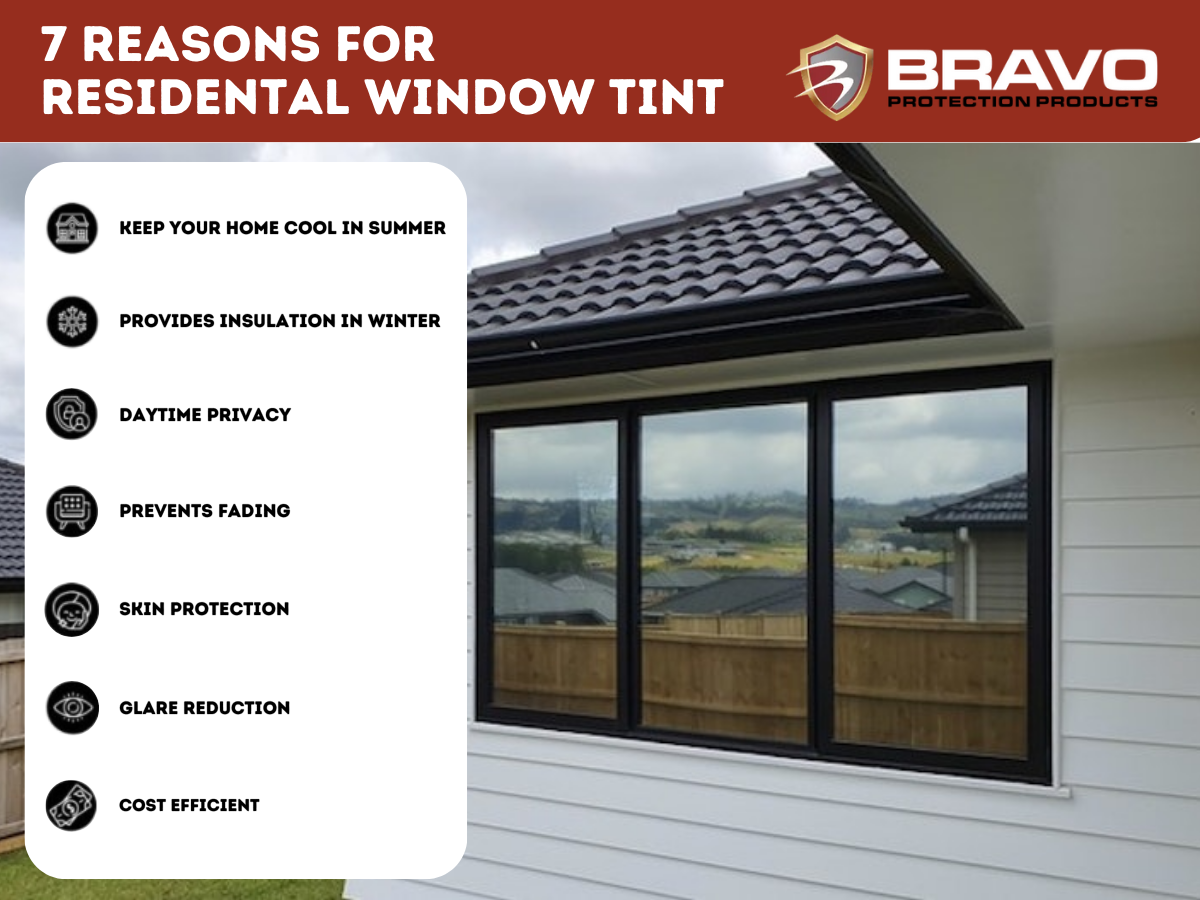Get Expert Guidance on Selecting the very best Residential Window Tint for Your Requirements
Get Expert Guidance on Selecting the very best Residential Window Tint for Your Requirements
Blog Article
How Residential Window Tinting Enhances Your Home's Power Efficiency
Residential window tinting offers an engaging solution for homeowners looking for to boost power performance within their living areas. By applying specialized films to home windows, it efficiently lowers heat transfer, thus maintaining indoor temperatures and lessening the requirement for extreme home heating or air conditioning.
Recognizing Window Tinting
Comprehending home window tinting is necessary for house owners looking for to improve both convenience and power effectiveness in their living rooms. Residential Window Tint. Home window tinting includes the application of a slim film to the interior or exterior surface area of glass home windows. This movie can substantially modulate the amount of sunshine and heat that gets in a home, therefore influencing interior environment conditions
There are different types of home window tinting movies readily available, each with distinct residential or commercial properties. As an example, colored movies take in solar energy, while reflective movies disperse it away from the glass surface. Ceramic movies offer a balance of visibility and warm being rejected, making them a prominent choice amongst home owners. The performance of home window tinting is commonly measured by its Visible Light Transmission (VLT) percent, which indicates just how much light can go through the film.
Benefits of Energy Performance
Home window tinting not just improves aesthetic appeals however likewise plays a substantial function in enhancing energy efficiency within residential spaces. By decreasing warm transfer through home windows, colored films produce a much more steady interior climate, which can result in considerable decreases in energy intake for heating and cooling. This power performance translates into reduced utility expenses, providing home owners with substantial lasting financial savings.

Furthermore, home window tinting improves the comfort of living areas. By minimizing glare and blocking unsafe UV rays, colored windows produce a more enjoyable environment, which can lead to improved wellness for owners. The defense against UV rays likewise aids maintain furnishings and flooring from fading, adding to the long life of house products.
Exactly How Tinting Works
Tinting films operate with a mix of innovative products and modern technologies created to control the amount of solar power going into a home. Mostly composed of polyester, these movies often incorporate ceramic or metal bits that show and absorb warm. This double capability allows them to considerably minimize the infiltration of ultraviolet (UV) rays and infrared radiation while permitting noticeable light to pass through.
The efficiency of home window tinting is measured by its solar warm gain coefficient (SHGC), which shows just how much solar power is transferred through the window. Reduced SHGC values are preferable as they represent greater warm denial. Additionally, home window tints can feature a variety of shades, allowing house owners to personalize their visual preferences while enhancing power performance.
Additionally, these films work as a barrier, stopping warmth loss during chillier months by showing interior heat back into the home. This thermal insulation impact complements the air conditioning benefits gained his comment is here throughout warmer months, adding to a balanced interior climate year-round. By managing solar power effectively, residential window tinting not just boosts comfort however additionally plays a vital duty in reducing energy usage and reducing energy expenses.
Selecting the Right Tint

There are different kinds of home window films available, consisting of colored, metalized, and ceramic. Ceramic movies give superb warmth control without endangering exposure and are highly long lasting, making them a popular choice.
Noticeable light transmission (VLT) is an additional crucial element, as it suggests the quantity of natural light that can travel through the tinted glass. Home owners need to pick a tint with a VLT that complements their lights preferences while still providing appropriate glare reduction.
Additionally, examining the solar warmth gain coefficient (SHGC) can assist determine exactly how well a color can obstruct warm from sunlight. A reduced SHGC indicates far better warmth control, ultimately enhancing energy efficiency.
Installation and Upkeep Tips
Appropriate installment and maintenance are essential elements in maximizing the benefits of property window tinting. Experts additionally utilize specialized strategies and tools, which can boost the longevity and efficiency of the color.
Complying navigate here with installation, upkeep is important to prolong the life of the window movie. It is suggested to wait at least 30 days before cleaning up the tinted home windows to allow the glue to treat totally.
Attending to these issues immediately can prevent more damages and keep energy efficiency. By sticking to these installation and maintenance ideas, home owners can ensure their window tinting proceeds to give considerable energy savings and convenience for years to come.
Final Thought
In verdict, residential window tinting serves as an efficient remedy for improving energy effectiveness within homes. By lowering heat transfer and obstructing unsafe UV rays, window films add to reduce power consumption and enhanced indoor visit this site right here convenience.
Window tinting entails the application of a thin movie to the inside or outside surface of glass home windows. By lowering heat transfer via windows, tinted films develop a much more secure interior climate, which can lead to substantial reductions in energy consumption for heating and cooling.The performance of home window tinting is determined by its solar warmth gain coefficient (SHGC), which shows exactly how much solar energy is transferred via the window. By taking care of solar power properly, residential window tinting not only improves comfort but likewise plays a crucial function in minimizing energy intake and lowering utility costs.
By reducing heat transfer and blocking damaging UV rays, window films add to reduce power usage and boosted interior convenience.
Report this page